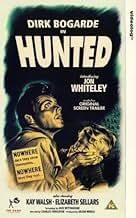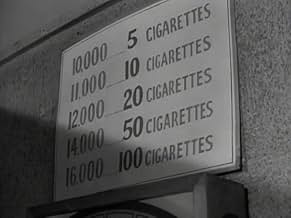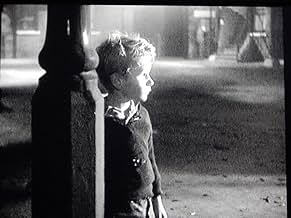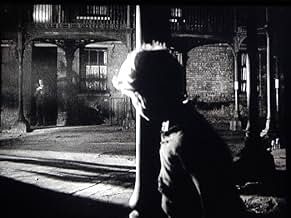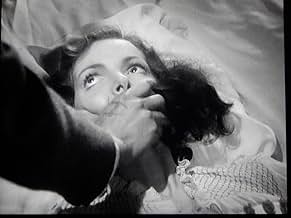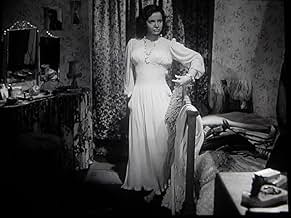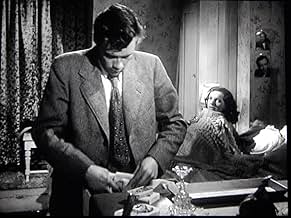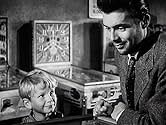CALIFICACIÓN DE IMDb
7.3/10
1.5 k
TU CALIFICACIÓN
Un fugitivo violento y un niño pequeño maltratado forman equipo para huir de la autoridad.Un fugitivo violento y un niño pequeño maltratado forman equipo para huir de la autoridad.Un fugitivo violento y un niño pequeño maltratado forman equipo para huir de la autoridad.
- Premios
- 1 premio ganado en total
- Dirección
- Guionistas
- Todo el elenco y el equipo
- Producción, taquilla y más en IMDbPro
Argumento
¿Sabías que…?
- TriviaSir Dirk Bogarde (Chris Lloyd) credited this movie with moving him into genuine stardom, and also often claimed that it was one of the very few movies he was in during the 1950s, of which he was proud.
- Citas
Chris Lloyd: Cup of coffee and a packet of Woodbines please.
[Checks his pockets for change]
Chris Lloyd: You can forget the Woodbines.
- ConexionesFeatured in Film Profile: Dirk Bogarde (1961)
Opinión destacada
From the opening scenes of Hunted, directly after the credits, when the dramatic music accompanies a little boy running through the streets of London clutching a teddy bear, we just know this is going to be a great film and it certainly is. Filmed in England and Scotland in late 1951 and released early in 1952, this truly is a wonderful film. The boy is six years old orphaned Scots boy Robbie Campbell (a truly outstanding debut performance by six years old Scots boy Jon Whiteley), who is running and searching for somewhere to hide after accidentally setting the kitchen curtains on fire in his adoptive London home and, believing he has set the house on fire, is fleeing the severe punishment that he believes will be meted out to him by his cruel and violent adoptive father. He ends up running into a derelict building on a bomb site some distance from home where he accidentally comes upon a man, Chris Lloyd (Dirk Bogarde), having just murdered his wife's lover in a crime of passion. Seeing that Robbie has seen the body and is the only witness to his crime, Chris abducts him and takes him on the run with him as he attempts to flee the country and the long arm of the law. Robbie, unloved at home and cruelly treated by his adoptive father, dare not return home and a bond develops between the two fugitives as Robbie flees his adoptive father and Chris flees the police and the hangman's rope.
Chris is at first completely uncaring and rough in his attitude to Robbie, but he gradually takes on the responsibility for Robbie's devotion as the two flee from London and travel up through the midlands to Stoke-on-Trent and then north into Scotland. As the journey gets tougher, Chris has to force Robbie to keep going, to carry him in his arms and to hold him, against the cold, as they sleep out in the wilderness.
It really is a superbly made drama and I read somewhere that, of all the many Rank films Dirk Bogarde made during his long career, this was his personal favourite. It is also a film record of a bygone post-war Britain; from its bomb sites and tramcars and horse drawn traffic in the capital, to the now long gone pottery factories of Stoke on Trent, belching forth their black smoke from huge bottle ovens and covered with industrial grime. The railway scenes in the film were filmed on the equally now long gone Potteries Loop Line at Burslem, Stoke-on-Trent, one of hundreds of lines that fell under the Dr Beeching axe in the 1960's. All completely gone now, but captured for posterity on 35mm black and white film in Hunted.
The film is also a social record of the UK in 1951, a time of general poverty; of post-war austerity and ration books, when everybody dresses so drably. The police in the film may, by modern standards, seem to be having great difficulty in tracking down Chris and Robbie. But you have to take into account the fact that in those days, television was in its infancy; the police had no personal radio communications or computers or helicopters and the pace of life was very different. In real life 1951, a man on the run could quite easily abduct a little boy and take him all over the country with him without being apprehended. So this film then is a contemporary account of how things would have been back in 1951.
Today, in an increasingly paranoid age when, in the minds of many, man abducting little boy equals sex, this film is from a time when characters in films apparently didn't even think of such things. This mindset is no better demonstrated than by one of the police officials in the film who confesses to a colleague that he can't understand what Chris Lloyd wants with the boy. "Why does he hang on to him?" These days, the police would probably put two and two together and make five. However, the story is far more complicated than it would seem at first glance. For the film is not really as much about child abduction as it is about two people of very different ages teaming up in a common cause. Neither of them can go home again and all they have is each other.
Early on in the film, before the loving relationship between Chris and Robbie develops, Chris says to the boy: "You don't like me, do you?" "No", says Robbie. "Well, why don't you go off home, then?" asks Chris. "I don't want to go home", answers Robbie. Hence his decision to stay with Chris. As soon as Robbie gets over the initial shock of being dragged off by Chris at the beginning of the film, he comes to realise that from now on, his only future is with his co-fugitive.
At only six and a half years of age, Jon Whiteley is perfect for this film and comes across variously as scared; devious;furtive and, for a short time, happy to be with Chris and away from his abusive home. His sheer delight at seeing men hay making in a field during the long journey north has to be seen to be believed. Dirk and Jon got on so well together that when the filming finished and they had to part, Jon was reportedly inconsolable. Dirk wanted to adopt the boy, but his friends persuaded him against it. The chemistry between Dirk and Jon is plain to see and what a team they make.
This film is an absolute classic. Beautifully acted; directed and photographed. One of the best British films of the 1950's. 10 out of 10 for this black and white gem.
Chris is at first completely uncaring and rough in his attitude to Robbie, but he gradually takes on the responsibility for Robbie's devotion as the two flee from London and travel up through the midlands to Stoke-on-Trent and then north into Scotland. As the journey gets tougher, Chris has to force Robbie to keep going, to carry him in his arms and to hold him, against the cold, as they sleep out in the wilderness.
It really is a superbly made drama and I read somewhere that, of all the many Rank films Dirk Bogarde made during his long career, this was his personal favourite. It is also a film record of a bygone post-war Britain; from its bomb sites and tramcars and horse drawn traffic in the capital, to the now long gone pottery factories of Stoke on Trent, belching forth their black smoke from huge bottle ovens and covered with industrial grime. The railway scenes in the film were filmed on the equally now long gone Potteries Loop Line at Burslem, Stoke-on-Trent, one of hundreds of lines that fell under the Dr Beeching axe in the 1960's. All completely gone now, but captured for posterity on 35mm black and white film in Hunted.
The film is also a social record of the UK in 1951, a time of general poverty; of post-war austerity and ration books, when everybody dresses so drably. The police in the film may, by modern standards, seem to be having great difficulty in tracking down Chris and Robbie. But you have to take into account the fact that in those days, television was in its infancy; the police had no personal radio communications or computers or helicopters and the pace of life was very different. In real life 1951, a man on the run could quite easily abduct a little boy and take him all over the country with him without being apprehended. So this film then is a contemporary account of how things would have been back in 1951.
Today, in an increasingly paranoid age when, in the minds of many, man abducting little boy equals sex, this film is from a time when characters in films apparently didn't even think of such things. This mindset is no better demonstrated than by one of the police officials in the film who confesses to a colleague that he can't understand what Chris Lloyd wants with the boy. "Why does he hang on to him?" These days, the police would probably put two and two together and make five. However, the story is far more complicated than it would seem at first glance. For the film is not really as much about child abduction as it is about two people of very different ages teaming up in a common cause. Neither of them can go home again and all they have is each other.
Early on in the film, before the loving relationship between Chris and Robbie develops, Chris says to the boy: "You don't like me, do you?" "No", says Robbie. "Well, why don't you go off home, then?" asks Chris. "I don't want to go home", answers Robbie. Hence his decision to stay with Chris. As soon as Robbie gets over the initial shock of being dragged off by Chris at the beginning of the film, he comes to realise that from now on, his only future is with his co-fugitive.
At only six and a half years of age, Jon Whiteley is perfect for this film and comes across variously as scared; devious;furtive and, for a short time, happy to be with Chris and away from his abusive home. His sheer delight at seeing men hay making in a field during the long journey north has to be seen to be believed. Dirk and Jon got on so well together that when the filming finished and they had to part, Jon was reportedly inconsolable. Dirk wanted to adopt the boy, but his friends persuaded him against it. The chemistry between Dirk and Jon is plain to see and what a team they make.
This film is an absolute classic. Beautifully acted; directed and photographed. One of the best British films of the 1950's. 10 out of 10 for this black and white gem.
- DavidW1947
- 22 ago 2009
- Enlace permanente
Selecciones populares
Inicia sesión para calificar y agrega a la lista de videos para obtener recomendaciones personalizadas
- How long is The Stranger in Between?Con tecnología de Alexa
Detalles
- Fecha de lanzamiento
- País de origen
- Idioma
- También se conoce como
- The Stranger in Between
- Locaciones de filmación
- Productoras
- Ver más créditos de la compañía en IMDbPro
- Tiempo de ejecución1 hora 24 minutos
- Color
- Relación de aspecto
- 1.37 : 1
Contribuir a esta página
Sugiere una edición o agrega el contenido que falta

Principales brechas de datos
What is the Brazilian Portuguese language plot outline for Hunted (1952)?
Responda
